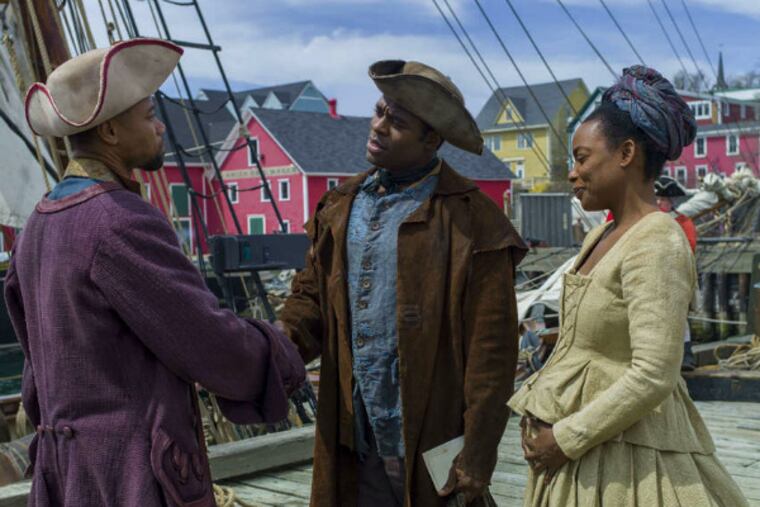‘Book of Negroes’ is a ‘Roots’ for the 21st century
A little known chapter of Revolutionary War history inspires an epic miniseries about slavery and survival.

* THE BOOK OF NEGROES.
8 tonight, tomorrow and Wednesday, BET.
MINISERIES are back in vogue, commissioned by networks looking for event programming and headlined by big names who wouldn't think of committing to multiple seasons.
Good as an "Olive Kitteridge" or a "Fargo" might be, they can feel, well, mini next to the blockbusters of the '70s and '80s - shows like "Roots," "The Winds of War" and "The Thorn Birds."
At six hours over three nights, BET's Canadian-produced "The Book of Negroes," which premieres tonight, is half the length of "Roots," but it's epic in scope, with a cast that includes Oscar winners Cuba Gooding Jr. and Louis Gossett Jr. (who, 38 years ago, co-starred in "Roots"), as well as "Rookie Blue" veteran Lyriq Bent.
And although it's not always easy to watch, it kept me riveted over a recent weekend.
Aunjanue Ellis ("NCIS: Los Angeles") dazzles as the uncompromising Aminata Diallo, who, after being captured by slave traders as a young girl in Africa, embarks on a journey that will take her to South Carolina and later to New York, Nova Scotia, Sierra Leone and London.
In tonight's installment, Shailyn Pierre-Dixon gives an impressive performance as the young Aminata, whose insistence on being addressed by her real name is one of the early signs that the character will refuse to see herself as powerless, even when she clearly is.
Based on a historical novel by Canadian writer Lawrence Hill, it's fiction inspired by a piece of history few Americans or Canadians know much about.
"It's an amazing story, and I think the lesson underneath it is that history belongs to the victors," Hill told reporters last month.
Growing up in Toronto as the biracial son of American-born parents, Hill said he'd learned, "as do all Americans, that the first person that died in the American Revolution was a black man, Crispus Attucks, who sided with the rebels."
Less known was the role that "black loyalists" played in the American Revolution, he said.
The British promised slaves their freedom "in exchange for service during the Revolution. So, because New York City was a central hub of British control during the seven- or eight-year Revolutionary War, thousands of blacks fled to New York City, hid in Canvas Town in the southern tip of the island and served the British," Hill said.
Problems arose when the British lost the war.
The decision was eventually made to ship 3,000 people to Nova Scotia, registering them beforehand in a document that was called, literally, the "Book of Negroes."
(Hill's book, originally released in 2007, was retitled Someone Knows My Name in the U.S. at the request, he said, of his publishers, who "worried that the title would offend African-American readers." It's been re-released here in conjunction with the miniseries as The Book of Negroes.)
Aminata, a midwife who learns to read and write and dreams of being a storyteller, is fictional, but the events she lives through aren't.
"I wanted to privilege a woman's story," Hill said, but he found few of the famous slave narratives had been written by women.
"She's not just a slave," he said. "She's a woman. She catches babies. She has a lover. She has children who she loses. She has parents. She's literate. I wanted to step deeply into her life and to portray a woman moving in and out of slavery in the 18th century."
As for the "Book of Negroes," it exists.
The original is in Britain's national archives, but you also can find it, Hill said, "in the New York central library. I've seen it there. . . . It's also viewable online. So it's a real history, but largely forgotten."
Phone: 215-854-5950
On Twitter: @elgray
Blog: ph.ly/EllenGray